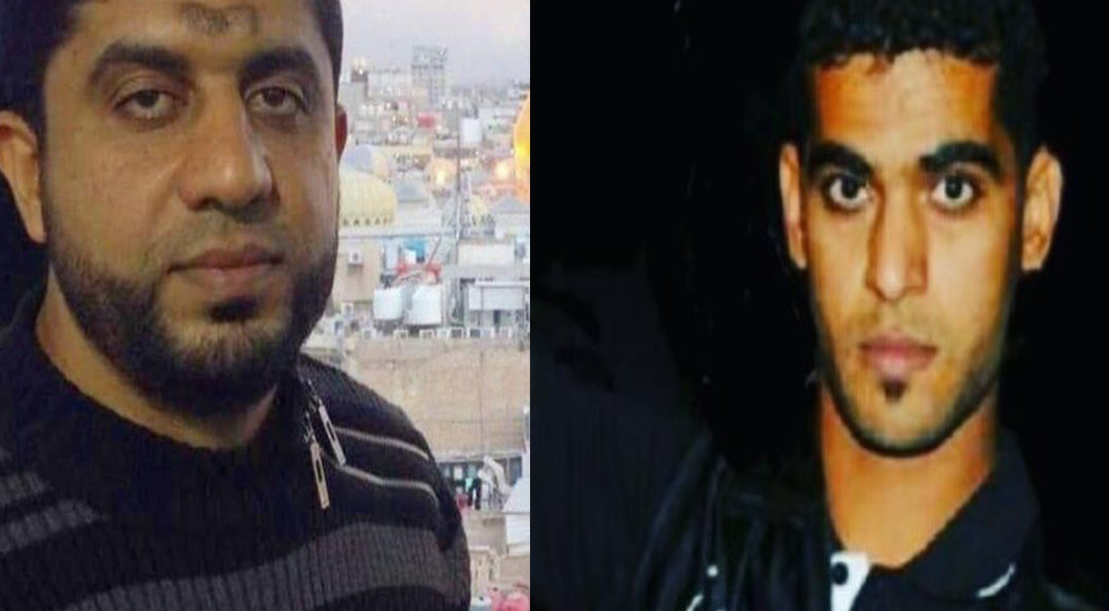Two Bahraini men were tortured into confessing acts of terrorism. With the last instance ruling of the Court of Cassation in Bahrain, Zuhair and Husain are at immediate risk of being executed.
Zuhair Ibrahim Jasim Abdullah, a 40-year-old former restaurateur, is the father of five children and was arrested on 2 November 2017. Following his arrest, he was held for 55 days in incommunicado detention. During this period he was reportedly exposed to ill-treatment and torture, including forced nudity, electrocution, sexual harassment, and beatings. During Zuhair’s detention, his wife was also separately beaten in her home and threatened at gunpoint and with rape by Bahraini officers. After 13 days of this ongoing ill-treatment in detention, Zuhair signed a forced confession obtained under torture admitting to several charges, which allegedly happened between 2012 and 2017. Some of these inadmissible charges as obtained under torture, were the membership to a terrorist organization, participating in the murder of security forces, and making and detonating explosives.
Although Zuhair’s lawyer stated that no physical evidence was presented to link him to the crimes, Zuhair was sentenced to death and stripped of his citizenship on 29 November 2018 in a grossly unfair trial. The judge refused to issue a court order permitting the Special Investigations Unit (SIU) and the Ministry of Interior Ombudsman, two oversight bodies, to disclose their findings of the investigation into the torture allegation of Zuhair. While Zuhair’s citizenship was reinstated on 15 June 2020, the death sentence was upheld by Bahrain’s highest appeals court.
This is a common urgent appeal between Americans for Democracy and Human Rights (ADHRB) and Action by Christians for the Abolition of Torture (ACAT France).


Do you want to support Zuhair Ibrahim Jasim Abdullah and Husain Abdullah Khalil Rashid?
- Download our letter template, personalize it with your contact details, and send it to Dunja Mijatović, the Commissioner for Human Rights at the Council of Europe by post or by email!
- Share their stories: Tweet, post on Facebook, spread the word!
Further Information
The Government’s Crackdown
In the advent of the 2011 Arab Spring, tens of thousands of Bahrainis took part in peaceful demonstrations in a movement calling for greater civil, political, and human rights in their country. The government responded with brute force, suppressing the uprising and implementing a crackdown on civil society. Since 2014, the crackdown has intensified with the dissolution of opposition parties and independent media, mass denaturalization, the imprisonment of opposition leaders, human rights defenders, activists, and journalists, and a clampdown on online criticism.
Since 2012, the government has already significantly expanded its penal code, counterterror legislation, and cybercrime law to broadly restrict civil society and effectively criminalize all forms of dissent. The Bahraini government also demolished the headquarters of an opposition newspaper, Al-Wasat. Additionally, peaceful protest and assembly continue to be violently suppressed, with demonstrators being convicted and sentenced in unfair mass-trials. In a February 2019 mass-trial, 167 people were handed prison sentences for their participation in a peaceful sit-in in 2016.
Breaking the seven-year de facto moratorium on Capital Punishment
Following the surge of political unrest, Bahrain broke their seven-year de facto moratorium on capital punishment in January 2017. On 9 January 2017, Bahrain’s Court of Cassation upheld the death sentences against Ali Al-Singace, Abbas Al-Samea, and Sami Mushaima. On 27 July 2019, Ali Al-Arab and Ahmed Al-Malali were executed less than a week after their sentences were upheld with no prior notice given to the men or their families. The UN, the European Parliament, and Special Procedures have condemned capital punishment in Bahrain.
The European Parliament has furthermore continuously voiced its concern regarding the Bahraini government’s sanctioning of the death penalty, unfair court proceedings, and torture practices. On 24 November 2015, a Parliamentary Question was issued by six members who inquired into potential steps that could be taken by the European External Action Service (EEAS) to revoke execution sentences in Bahrain, which was recently reiterated on 21 January 2020. A Resolution on Execution was also voted through on 16 February 2017. On 20 December 2019, twenty members sent a letter to Shaikh Khalid bin Ali bin Abdullah Al Khalifa, the Minister of Justice, Islamic Affairs and Endowment in Bahrain, stating their concerns on the case of two Bahraini men, Mr. Ramadan and Mr. Moosa, currently on death row. Additionally, in 2016, the European Parliament adopted Urgency Resolutions on their cases and ongoing human rights abuses in Bahrain. In 2018, Special Rapporteurs addressed the Bahraini King by stating their concern about 20 men on death row, including Zuhair Ibrahim Jasim Abdullah.
Nonetheless, Bahrain continues to show contempt for the due legal process and international standards, using the court system as an instrument to silence political dissidents. Two years later, on 27 July 2019, the government of Bahrain executed Ali Al-Arab and Ahmed Al-Malali. Currently, 26 political and nonpolitical prisoners are on death row in Bahrain, ten have finished all the legal remedies, two are on appeal (Mohamed Ramadan and Husain Moosa), and seven are in exile. Bahraini oversight bodies that are mandated to investigate human rights abuses, such as the National Institution for Human Rights (NIHR), the Special Investigations Unit (SIU), and the Ministry of Interior Ombudsman (MOI), have been criticized by international organizations, including the UN Committee Against Torture, for their lack of independence, effectiveness, failure to meet international standards, and complicity in covering up human rights abuse.
Bahrain’s Violation of International Law
The government of Bahrain’s continued the use of capital punishment, although UN Special Rapporteurs have previously urged Bahrain to restore the de-facto abolition of the death penalty. Furthermore, it violates the Convention Against Torture and other Cruel, Inhuman and Degrading Treatment or Punishment, Articles 7, 9, and 14 of The International Covenant on Civil and Political Rights (ICCPR), and the Second Optional Protocol to the International Covenant on Civil and Political Rights, aiming at the abolition of the death penalty, which Bahrain did not sign yet, and Article 12 of the International Covenant on Economic, Social and Cultural Rights. According to the UN Committee Against Torture in 2017, the trial and ongoing treatment of those on death row also fail to meet international standards of fair trial and due process. Moreover, the King of Bahrain ratified a constitutional amendment that allowed for the military trial of civilians and resulted in six men being sentenced to death. The amendment fundamentally violates international law and standards for a fair trial, as recognized by the ICCPR.





